Friday Feb 20, 2026
Friday Feb 20, 2026
Friday, 7 December 2018 00:00 - - {{hitsCtrl.values.hits}}
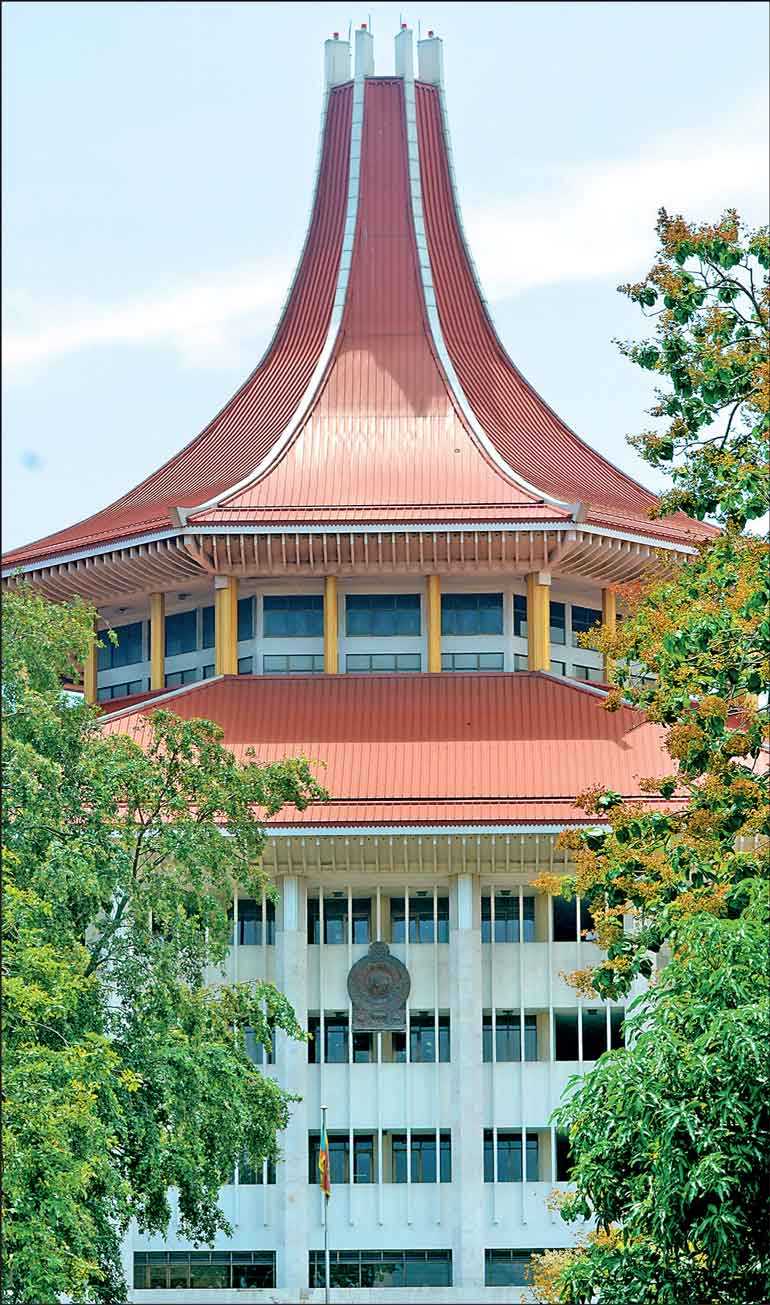
The State can be compared to a machine of special type. Anyone who carefully reviews this machine and its operation would not find it difficult to see its faults and predict the duration of its life well in advance. By the end of the LTTE rebellion, the Sri Lankan State was in a dire state of virtual collapse. It needed large-scale structural reforms for a good way forward. Yet, it became evident that the rulers did not have a political vision and the necessary wisdom for that. In this backdrop, I observed that the country would soon be plunged into a big anarchy.
necessary wisdom for that. In this backdrop, I observed that the country would soon be plunged into a big anarchy.
In 2011, I wrote and published a book titled ‘Lankava Galavaganeema’ (how to save Sri Lanka) to explain this situation. I argued that the circumstances prevailed in the country would inevitably lead to an anarchic situation and the political parties in Sri Lanka did not have the wisdom to save Sri Lanka from this eventuality and therefore it was necessary that we create a new social movement based on non-violence and democratic values.
It was evident from the very beginning of the new administration that such a change would not occur even after the defeat of Mahinda Rajapaksa regime and the victory achieved by anti-Mahinda forces. The limited reforms program borrowed from the ‘Sadharana Samajayak Sandahaa vana Vyaparaya’ (Movement for Heralding a Just Society) and implemented by the Yahapalana Government seemed to me a foolish program that would speed up the country to a growing anarchy.
The 19th Amendment to the Constitution came under my serious criticism. I maintained that even though certain defects of the constitution could be rectified by a constitutional amendment, a new system of government replacing the existing system cannot be introduced by a constitutional amendment; it calls for the adoption of a completely a new constitution. My argument was that such an effort will inevitably end up in a constitutional crisis pushing the country in to a state of anarchy. I have written about it.
One-and-a-half years before the present constitutional crisis, we have been able to create a social movement called ‘Punarudaya’ (the Renaissance) which appeared for a structural transformation in the face of an anarchic situation, a political tsunami likely to happen in the future. The Punarudaya movement was engaged in a program of enlightening the public of this political tsunami.
A massive program of work to convince people’s organisations was also undertaken by the Punarudaya movement to bring together such organisations to work jointly to face the disastrous situation. At the end the anticipated political tsunami burst out. However, this program was initiated two to three months before the advent of the current political tsunami. 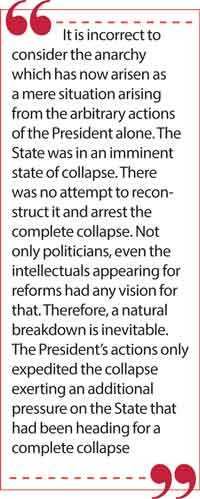
In this context, it is inevitable that the entire institutional system of the State will collapse. Now the Executive and the Legislature are in a state of complete disintegration. Although the Judiciary seems to be gaining a renewed life, there may be a situation where the orders of the Judiciary may not be heeded. If that happens, the existence of the Judiciary will be at threat and it may lead to create a complete state of anarchy.
It is incorrect to consider the anarchy which has now arisen as a mere situation arising from the arbitrary actions of the President alone. The State was in an imminent state of collapse. There was no attempt to reconstruct it and arrest the complete collapse. Not only politicians, even the intellectuals appearing for reforms had any vision for that. Therefore, a natural breakdown is inevitable. The President’s actions only expedited the collapse exerting an additional pressure on the State that had been heading for a complete collapse.
At this moment of crisis in which the Sri Lanka State is facing a complete collapse, I think it may be important to consider the reasons that had led to the deterioration and breakdown of the State in order to have a vision for salvation.
The role played by rebellions
Generally, modern nation-states are built on the foundation of modern nationhood. However, the State of Sri Lanka was built without such a firm foundation. It was not a State that accorded equal recognition and respect to all the people living in Sri Lanka. It could be considered as a state that gave more preference to ethnic, caste and religious majorities and lesser preference to minority concerns. Hence, the conflicts caused by racial, caste, and religious differences led to weaken the foundation of the State further and also to weaken the very structure of the State itself.
The changes made to the Constitution merely to satisfy the power hunger and selfish ambitions of the rulers’ ignoring the common good of the State can be considered an important factor that had led to weaken the consistency and the integrity, the indispensable and essential hallmarks of a State thereby putting an end to the orderly functioning of the State.
After abolishing the parliamentary system and introducing a presidential system of government in its place, the balance between the three major power units i.e. the Executive, Legislature and Judiciary was completely lost and the Legislature and Judiciary were made subordinates of the Executive. This situation weakened the democratic form of the State promoting an authoritarian form of government. Consequently; the ability to make peaceful protest was lost thrusting the country towards a path of violent struggles.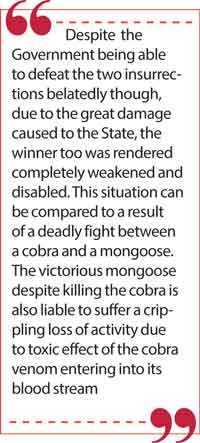
The country’s national leadership did not consist of mature statesman. The independence movement did not produce such leaders. Our leaders did not have the necessary insight to foresee the insurrections and the storms in the political horizon and prevent them happening. They lacked the practical knowledge to suppress them immediately when they happened and before it goes out of control. Also, they did not have the wisdom and the discipline they needed to cure and heal the suffering caused to the loser so that the scars won’t become pestering and long-lasting; they also lacked the wisdom and the discipline to explore the conditions that led the youth to revolt and find solutions for them.
Like the JVP’s second insurrection, the LTTE rebellion was also defeated only when it had reached a crucial point nearing a virtual victory. The prolongation of the suppression of rebellions had resulted in increasing the damage caused to the State and society manifold. Even the ’83 Black July incident went too far when there was a real possibility to crack it down immediately. The Sinhala and Tamil insurgents unleashed a massive ruthlessness on the State and in society.
Similarly, the security forces managed to suppress the two insurgencies by unleashing a ruthlessness which was much more than the ruthlessness unleashed by the armed rebels. After suppressing the rebels no immediate measures had been taken to heal the sufferings of the victims. There were no attempts made to find out the reasons that led both Sinhalese and Tamil youth to rebel separately against the State or to find solutions to their grievances.
Despite the Government being able to defeat the two insurrections belatedly though, due to the great damage caused to the State, the winner too was rendered completely weakened and disabled. This situation can be compared to a result of a deadly fight between a cobra and a mongoose. The victorious mongoose despite killing the cobra is also liable to suffer a crippling loss of activity due to toxic effect of the cobra venom entering into its blood stream.
The decline of the Legislature
The conflicts that prevailed over a long period of three decades have resulted in creating an uncivilised background causing a complete breakdown of the law and order of the country. With this, there occurred a serious collapse in the decency of the State, ruling parties, government officials and society in complying with the law. It was during this uncivilised period that the plundering of public property in the hands of the ruling party becomes a pervasive feature of State rule. 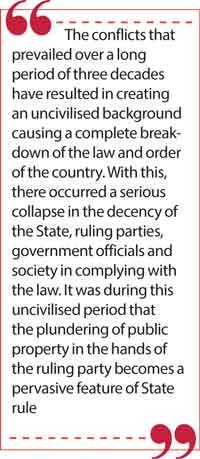
However, the leaders who ruled the country before 1977, whether they were good or bad, did not play a predatory role. There was no room for such a role even by law. At that time, most of the politicians became impoverished rather than becoming rich. MPs who were elected to Parliament were banned from doing business with the government. Members who transacted business with the government were deprived of their parliamentary seat.
The best illustration for this is Albert Silva who was elected to the Galle constituency in 1977. He lost his parliamentary seat by a Court decision as he held a kerosene permit issued by the government. This is a prime principle being practised in all countries where there is a democratic system of government. It is essential and indispensable for the wellbeing of a democratic system of government. It was President J.R. Jayewardene who made this principle ineffective following the footsteps of emperor Napoleon. Napoleon was his ideal hero.
Napoleon conquered Europe using a mercenary army. To maintain the militant spirit of the mercenaries Napoleon allowed them to plunder the cities captured by them. J.R. Jayewardene also adopted a similar policy for the ruling party members. He suppressed the law that prevented them doing business with the government.They were given the right to business with the government, enabling them to become wealthy.
President Jayewardene setting an example to MPs exchanged a barren coconut land for fertile land owned by the Land Reforms Commission. A large number of ruling party members were given a chance to become planters by allowing them to purchase the Estate Land owned by Land Reforms Commission at a very low price. In addition, many MPs of the Government became licence holders for sand, rocks and timber businesses.
During the reign of President Chandrika Kumaratunga, MPs were granted liquor licenses. Therefore, a considerable number of Members of Parliament directly or indirectly became tavern owners. This corrupt system did not stop at MPs. It expanded its influence corrupting the entire institutional system of the country.
The politician and the criminal
Institutionalisation of notorious criminals of the country as adjunct to the State is another important factor influencing the decline of the State. This aspect has not caught much attention of critics. The credit for analysing this element should go to Prof. Gananath Obeyesekere who had made a study on this issue covering the period preceding the JVP’s second insurrection.
The criminals were enlisted in various State institutions and assigned a salary scheme so that they could be used to subdue student agitations and workers strikes. They did not report to work. The only service received from them was thuggery. Whenever there was a need for thugs in suppressing protests, it was they who provided it. 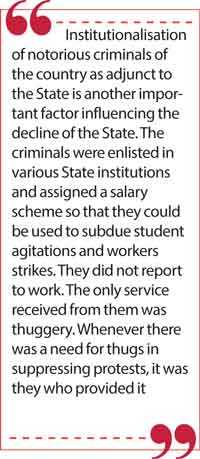
The institutionalisation of criminals had a dramatic increase with the JVP’s second insurgence. The ruling party members received death threats from rebels and for their security they were given the right to set up and maintain private armies which often consisted of the notorious criminals and thugs in the area. They were given training by the government security forces on using weapons. They also received firearms. Consequently, a situation arose in which the politicians depended on criminals and the criminals depended on politicians. The criminals became an important cog in the State machinery. They found refuge in the State and became the protectors of politicians. While hunting the rebels they pursued their familiar scandalous activities like looting, extortion and drug trafficking.
As they had become a special group receiving State protection, the Police had to abandon law enforcement against them. The high-ranking Police officers were compelled to work in collaboration with criminals who used to work closely with politicians. The criminals who received protection of the State had an impact not only on the Police, but also on politicians. Some politicians, in addition to hunting rebels, joined the criminals and hunted their political opponents on the pretext of suppressing rebels. Others supported them with their scandalous activities like looting, extortions and drug trafficking and received economic gains from their illegal practices.
The coalition between politicians and criminals created this way continued even after defeating the JVP insurrection in view of the persistence of the atrocities of the LTTE in the north. It became a long-standing subject. Thus, selected criminals receiving State protection and distribution of firearms for private armies caused a rapid increase in the underworld activities and crimes in the country
A certain section of deserters of the JVP, LTTE and the government security forces joining the underworld was another factor leading to the expansion of the world of criminals. The relationship developed between the politicians and the criminal elements during the times of JVP insurrection persists even to date. To a certain extent, this had resulted in making the politician a criminal and vice versa. Because of the protection received from the State, some criminals who should have been in jail had been able to live freely and become big businessmen. Not only had the houses of politicians, even the luxury mansions of the Heads of State become a safe refuge for criminals. In this process, the State has lost its democratic face assuming a repulsive look of an exploitative State of thieves.
It’s important that we study the education system in Sri Lanka in general and media system in particular and see how these spheres have impacted on the rotten State and the collapse of the State that we witness at present.